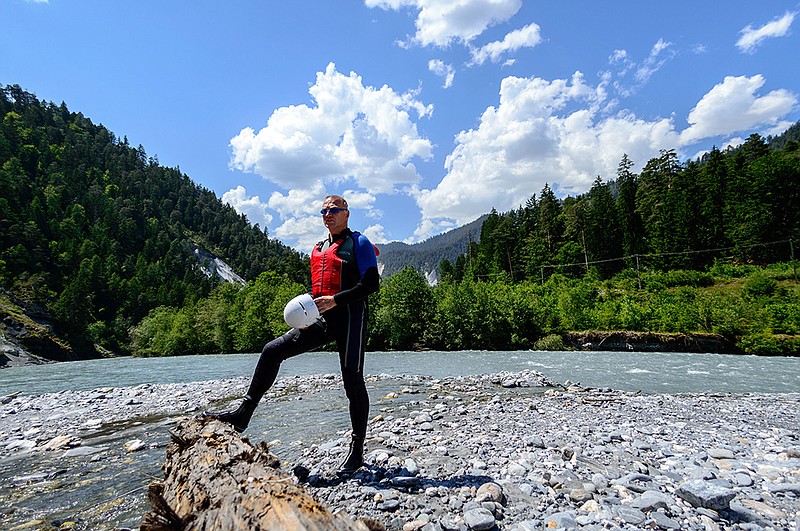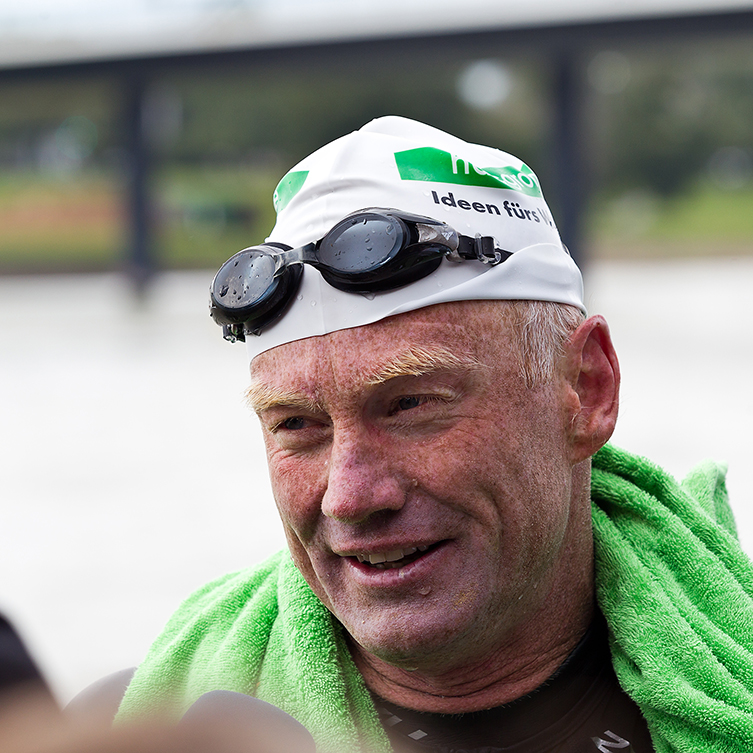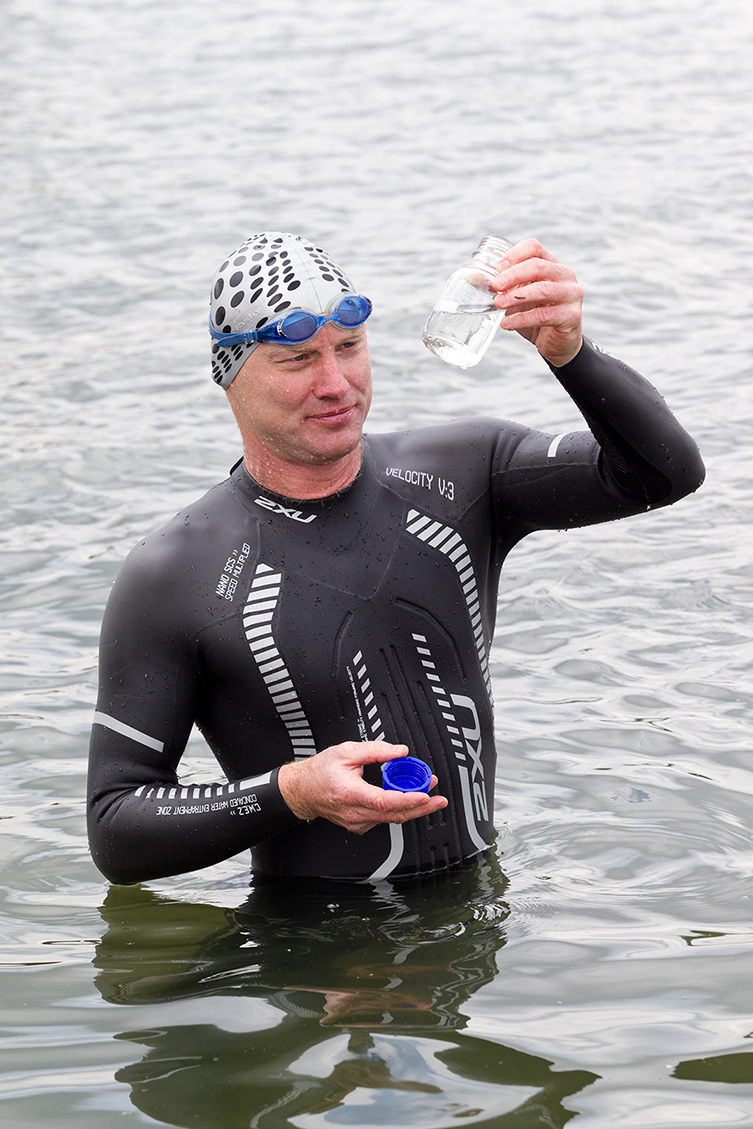Chattanoogans may not know the name Dr. Andreas Fath, but they will very soon. Beginning July 27, the professor of medical and life sciences at the University of Furtwangen in Germany plans to swim the length of the Tennessee River - all 652 miles, more than the distance from Chattanooga to the Great Lakes.
In 2014, Fath swam the Rhine River's 766 miles in only 28 days, breaking the world record for a marathon swim. It wasn't fame or a personal best he sought, but awareness of water quality. He performed water analysis studies throughout his journey to inform citizens how what they consume affects the local water supply.
"The microplastic problem is one example," Fath says, referencing the tiny particles from plastics overtaking the world's waters, which a United Nations report recently identified as one of the most dangerous environmental problems facing the world today. "The project and the results will make people aware of their influence. Small changes in their behavior will have a big positive effect on water quality."
Through his upcoming trip, Fath hopes to bring that message to America.
Get Out: What do you expect regarding the health of our local waters?
Andreas Fath: From previous water quality results, I expect no negative health effects during the swimming period. The water does not have drinking water quality, so I will try to avoid drinking it. The interesting question in the comparison to the Rhine is, how effective are the sewage systems in the States, and are there differences in food culture, industrial wastewater treatment, agriculture and drug consumption?
GO: Any other potential health risks?
AF: Here in Germany I am always asked whether there are no dangerous bull sharks or crocodiles in the Tennessee River. After a guided tour to the Tennessee Aquarium from its director, Anna George, I am calmed down. The only dangerous animals in the water are the snap[ping] turtles, and they only bite when you step on them. Another problem could be the bacteria. Small wounds caused by a step on broken glass or a rash by the velcro fastener from the wetsuit could cause a febrile inflammation or an infection.
GO: What will be the greatest challenge?
AF: Locks and dams where there is no current at all supporting the swim. In the Rhine, I just had to cross the Lake Constance. In the Tennessee River, there are nine lakes of that length. The average flow rate of the Rhine was 3-4 mph. The flow rate of the Tennessee is about 1-2 mph. That means the swim will be longer and more exhausting.
GO: How long will you be in the water each day? Do you have a target distance you want to reach at the end of each day?
AF: A working day is 8 hours, and so will be a swim day. My target distance is 20-25 miles a day depending on the flow rate.
GO: How long do you think it will take?
AF: Hopefully I can do it in 31 days. I would like to finish [by] the first of September, because it is my 22nd wedding anniversary.
GO: What does your wife think about your extreme distance swims?
AF: My wife has ambivalent thoughts. On one hand, she likes swimming too and she will swim some tracks with me (hopefully). On the other hand, she has different ideas of spending family summer holidays.
GO: How did you get into distance swimming?
AF: My sons started first and I drove them to those events. Once I noticed that there is a Masters rating for older people, my wife and I started to compete ourselves. I did some long open water competitions in Austria, Switzerland and Germany with good results, and gained the experience that it is more fun and more diverse than swimming in a pool counting the tiles.
GO: Where does your mind go when you're swimming for so long? How do you entertain yourself for hours in the water?
AF: At the Rhine there was a lot of activity during the swim: buoys, sampling, swimming with partners (sons, friends, politicians), traffic, walking around locks and dams, interviews, films and photos. For me, swimming is a journey in the water. I perceive the landscape from the water perspective gliding on its surface. That's an amazing and unforgettable experience.
GO: Have you ever been to Tennessee before?
AF: I have been in Sewanee twice visiting The University of the South, the Knoll family, the Tennessee Aquarium and the Choo Choo in Chattanooga. During this promotion tour where I presented the results of the Rhine project at Sewanee University and UGA, I also used the opportunity to "Swim the Suck." I was impressed by the landscape along the river and the kind, friendly and open-minded people there, especially the COWS (Chattanooga Open Water Swimmers). I would love it to get some accompaniment from the COWS and others at the TenneSwim.
GO: Do you plan to reward yourself after finishing the swim?
AF: A candlelight dinner with wine and a five-course meal in a beautiful restaurant with family and all members of the TenneSwim team would be the best short-term reward I can think of. An entire inventory of the water quality of the Tennessee River with respect to several POPs (persistent organic pollutants), microplastics and metal ions and the comparison to the European river results, summarized in popular and scientific publications, would be the desired long-term reward - but only if they make a difference and change people's behavior.
Follow along:
To keep up with Dr. Andreas Fath’s Tennessee River journey — and water quality findings regarding pharmaceuticals, pesticides, bacteria and heavy metals — visit tenneswim.org. The Tennessee Aquarium, one of his many partners for the trip, plans to welcome him with fanfare when he arrives in Chattanooga, tentatively in early August.


